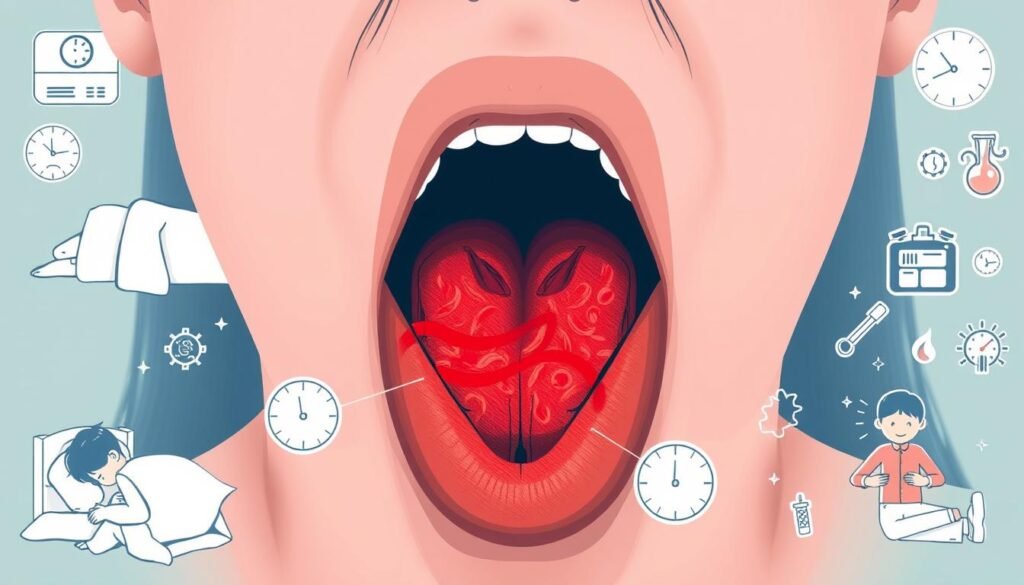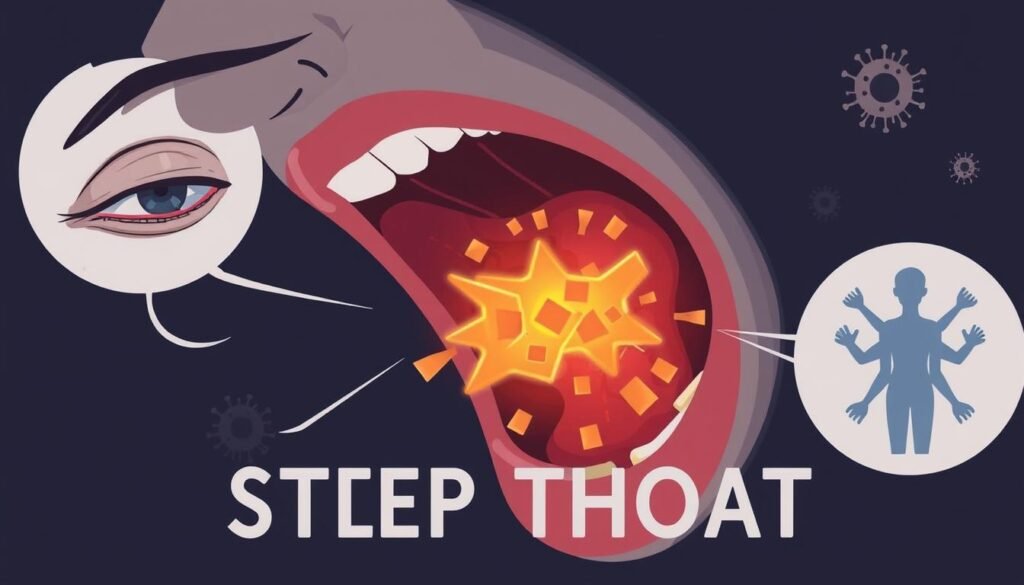About 5.2 million people see a doctor for strep throat each year in the U.S. This illness, mainly from *Streptococcus pyogenes*, usually affects kids. But anyone can get it. While most know about its sore throat and fever, we don’t often talk about how it makes you feel very tired. So, can strep make you tired? This article looks closely at strep throat, its signs, and the surprising way it’s linked to feeling exhausted.
Key Takeaways
- Strep throat is caused by the *Streptococcus pyogenes* bacteria.
- Common symptoms include sore throat, fever, and fatigue.
- About 5.2 million outpatient visits annually are due to strep throat.
- Complications can arise if strep throat is left untreated, including rheumatic fever.
- Seeking medical attention is key if symptoms persist past a week.
Understanding Strep Throat
Strep throat is a contagious illness caused by bacteria. It mainly affects the throat and tonsils. Symptoms include a severe sore throat, fever, and tiredness. It’s common among kids and teens, especially from ages 5 to 15.
The disease spreads through coughs and sneezes. It can spread before symptoms show, in the first 2-5 days. That’s why good hygiene is vital, especially at school or daycare.
Expect symptoms to be uncomfortable. They include a very sore throat and swollen neck glands. You might also have headaches or muscle pain. Nausea, vomiting, and a rash are less common signs of the disease.
Antibiotics are key for treatment, shortening the sickness to 3-5 days. Getting medical help early makes symptoms less severe. Without treatment, strep throat can last longer. Knowing about this sickness helps in preventing and treating it effectively.
Common Symptoms of Strep Throat
Knowing the signs of strep throat is key to getting better fast. This illness affects the throat and tonsils because of the Streptococcus bacteria. The main signs are a really bad sore throat and painful swallowing. Often, tonsils get red, swollen, and might have white spots. Catching it early makes recovery easier.
Identifying the Sore Throat
A sudden, intense sore throat is a clear sign of strep. This pain is sharper than the usual sore throat and gets worse quickly. If your throat pain is way worse than normal, it could mean strep. Knowing this helps get the right treatment sooner.
Accompanying Symptoms to Watch For
Along with a sore throat, strep can cause:
- Swollen lymph nodes in the neck
- Fever
- Headaches
- Fatigue
These signs are clues that it might be strep, especially in kids from 5 to 15. To learn more about these symptoms, check out the AMA Association.
Differences from Viral Infections
Distinguishing strep throat from viral infections is critical. Viral infections may have symptoms like coughing or phlegm, which strep does not. Doctors usually need to do a quick test to confirm if it’s strep throat.
Does Strep Cause Fatigue?
Is there a link between strep throat and feeling tired? Many people with strep experience fatigue. This is mainly due to the immune system working overtime to fight the infection. The effort to battle the bacteria can leave individuals feeling exhausted. This impacts daily activities significantly.
The Connection Between Strep and Low Energy
There are several reasons why strep can make you feel drained. The infection can cause fever and inflammation. These factors make you feel unwell. As the body fights the strep bacteria, you might find yourself lacking energy and feeling more tired than usual. To understand more about strep, compare it to other illnesses like mono. An informative article provides further insights.
Mechanisms of Fatigue during a Strep Infection
Several factors contribute to fatigue when you have strep. The body’s defense against the infection causes inflammation, adding stress to your system. Fever, especially if it’s above 101°F, can also cause tiredness. Your body uses a lot of energy to keep things in balance. That’s why rest is crucial during this time. Recognizing these symptoms helps in preparing for the fatigue that may continue even after other symptoms are gone.
Additional Symptoms of Streptococcal Infection
Strep infections bring more than just a sore throat. Fatigue is often seen with strep throat, but there are more symptoms. Knowing all symptoms is key for good treatment.
Headaches and Body Aches
Headaches and body aches are common with strep. They result from the body fighting off the infection. Understanding these can help with better treatment.
Fever and Chills
Fever and chills are frequent signs of strep throat. The body raises its temperature to fight the infection. These can last about seven days, making you feel more tired.
Loss of Appetite
Strep throat can make you not want to eat, increasing fatigue. This can slow down recovery. It’s important to manage eating to help heal and regain energy.

| Symptom | Description | Impact on Health |
|---|---|---|
| Headaches | Pain in the head region, often stress-related or a result of inflammation. | May lead to decreased concentration and productivity. |
| Body Aches | General discomfort in muscles and joints. | Can contribute to overwhelming fatigue. |
| Fever | Elevated body temperature as the body fights infection. | Indicates inflammation; if prolonged, could lead to further health concerns. |
| Chills | Shivering sensations indicating a rise in body temperature. | Signals the body’s alertness to infection; may indicate worsening condition. |
| Loss of Appetite | Decreased desire to eat. | Can lead to nutritional deficiencies and prolonged recovery. |
Fatigue After Strep Throat: What to Expect
Many people feel very tired after having strep throat. This fatigue after strep throat can really affect your daily life. Usually, you’ll start to feel a bit better within five to seven days if you’re taking antibiotics. However, some people may feel tired for a longer time, which can affect their strep recovery.
Expected Timeline for Recovery
The healing from strep throat often starts soon after you begin antibiotic therapy. However, how long the post-strep fatigue lasts can vary a lot from person to person. Knowing what to expect can help you set realistic goals:
| Days After Treatment | Typical Symptoms | Recovery Expectations |
|---|---|---|
| 0-2 Days | Severe throat pain, fever | Begin treatment with antibiotics |
| 3-5 Days | Improved throat symptoms, persistent fatigue | Symptoms get better but you may still be tired |
| 6-10 Days | Reduced pain, continued fatigue | You’ll notice a big improvement but might still feel tired |
Factors Affecting Post-Strep Fatigue
There are a few reasons why recovering from post-strep fatigue can be harder for some people:
- Age: Recovery can take longer for older adults.
- Underlying Health Conditions: If you have other health problems, you might feel more worn out.
- Severity of Infection: A worse infection can mean longer tiredness.
Knowing these factors can help you plan for your recovery. It’s important to take good care of yourself to get over the fatigue.
Complications Associated with Strep Throat
If strep throat is not treated, it may cause serious health issues later on. Knowing these possible complications helps catch them early. For example, rheumatic fever is a big risk because it happens when our immune system reacts wrongly to a strep infection.
Potential Long-Term Effects of Untreated Strep
Not treating strep throat can lead to conditions like rheumatic fever and post-streptococcal glomerulonephritis (PSGN). These can happen days or weeks after the first infection.
- Rheumatic Fever: It’s more common in kids aged 5 to 15 and can harm the heart for a long time.
- PSGN: It often starts about 10 days post-infection, causing dark reddish-brown urine and less urination.
It’s important to know the signs of strep complications. Spotting them early means treatment can prevent heart or kidney damage.
Understanding Rheumatic Fever
Rheumatic fever comes from a faulty immune reaction after a strep infection, causing inflammation that harms the heart and joints. Treating strep throat quickly is key to avoiding this danger. Rheumatic fever signs include:
- Joint swelling and pain
- Fever
- Fatigue
- Heart palpitations
Rheumatic fever may rarely harm heart valves, leading to severe conditions like rheumatic heart disease. Preventing it includes proper antibiotics for strep throat. For more about strep throat complications, look at Mayo Clinic’s guidelines.

Treatment Options for Strep Throat
Treating strep throat involves a few effective methods. Antibiotics play a vital role in speeding up recovery. Home remedies also help provide comfort.
Importance of Antibiotics in Recovery
Antibiotics are key in treating strep. They usually are taken for about 10 days. Amoxicillin and penicillin are top choices due to their safety and effectiveness. These meds start to cut down symptoms in one or two days. You’ll begin to feel better quickly.
Antibiotics also lower the chance of getting complications like sinus infections or rheumatic fever. They even help stop the spread of bacteria to others.
Home Remedies to Alleviate Symptoms
Alongside antibiotics, home remedies can ease strep throat discomfort. Some effective methods include:
- Gargling with warm salt water to soothe irritation.
- Hydration through plenty of fluids to avoid dehydration and keep the throat moist.
- Using over-the-counter pain relievers like acetaminophen or ibuprofen to reduce pain and fever.
- Soothing throat lozenges for temporary relief.
- Rest because it’s crucial for recovery.
When to Seek Medical Attention
Knowing when to see a doctor is crucial. If symptoms don’t improve or get worse despite antibiotics, you might need further checks. Signs of an allergic reaction to antibiotics, like rashes or breathing issues, need immediate care. For recurrent strep throat, a healthcare provider might suggest different antibiotics or even tonsil removal.
| Treatment Option | Description | Benefits |
|---|---|---|
| Antibiotics | Medications like amoxicillin and penicillin | Speed recovery, reduce symptoms, prevent complications |
| Warm Salt Water Gargles | A mixture to soothe throat | Reduces irritation and discomfort |
| Pain Relievers | Over-the-counter options like ibuprofen | Alleviate pain and lower fever |
| Hydration | Drinking plenty of fluids | Prevents dehydration, keeps throat moist |
| Rest | Ensuring adequate sleep and leisure | Supports overall recovery process |
Strep Recovery: Tips for a Smooth Convalescence
Getting over strep requires rest, good care, staying hydrated, and eating right. Your body needs plenty of time to recover. This means lots of sleep and less activity to fight the tiredness strep causes.
Suggested Rest and Care Practices
Rest is key when getting better. Taking it easy helps get your energy back after strep throat. Do light things like reading or watching TV. This keeps you entertained without making you too tired. Talking to loved ones can make you feel better too, without slowing down your recovery.
Importance of Hydration and Nutrition
Drinking enough is super important for getting better. It helps your immune system and heals your body. You should drink a lot, like water, herbal teas, and broths. This makes your throat feel better and ensures you’re getting important nutrients.
Eating right also boosts your energy. Eating soft foods can make swallowing easier. Try things like pureed fruits, oatmeal, and smoothies. They’re both healthy and easy to eat.
To learn more about keeping your body strong during recovery, look at natural remedies for adrenal fatigue. These tips can help you feel better and fight off tiredness.

| Category | Suggestions |
|---|---|
| Hydration | Water, herbal teas, broths |
| Nutrition | Soft fruits, oatmeal, smoothies |
| Rest Practices | Light reading, low-energy interactions |
Recognizing Strep Complications Early
Knowing when strep complications arise can majorly impact how well someone recovers. It’s important to recognize serious symptoms early on. Watch out for signs that go beyond usual strep throat symptoms.
Monitoring for Severe Symptoms
People healing from strep throat need to watch out for severe symptoms. These serious signs include:
- High fever, especially if it’s 101°F or more.
- Trouble breathing suddenly.
- Intense headaches that don’t go away.
Such symptoms may indicate serious strep complications. Knowing these signs helps in identifying when strep symptoms are not normal.
Seeking Timely Medical Intervention
Getting medical help for strep early is key to avoiding serious problems. If you have the symptoms mentioned, see a doctor quickly. Quick treatment helps stop issues like rheumatic fever, which can harm important organs.
Doctors use special codes to figure out the best treatment and make care decisions. For more on diagnosing and managing fatigue, check out this guide on fatigue and medical codes.
Conclusion
Knowing how strep throat can make you tired is key. This infection can cause many symptoms, including tiredness. It’s important to focus on getting better. Antibiotics are vital to improve quickly and avoid serious problems like rheumatic fever. This fever can harm your health for a long time.
If you catch strep throat early and get treated, you can keep your health in check. Feeling tired after you get better is normal. But, with enough rest, good food, and water, you will get your energy back. Sticking to your treatment is crucial for a full recovery. It also prevents more serious health issues.
In short, being aware and taking care of strep throat early leads to an easier recovery. Watch your symptoms and learn about the risks. Doing this helps maintain your health and energy in the long run.